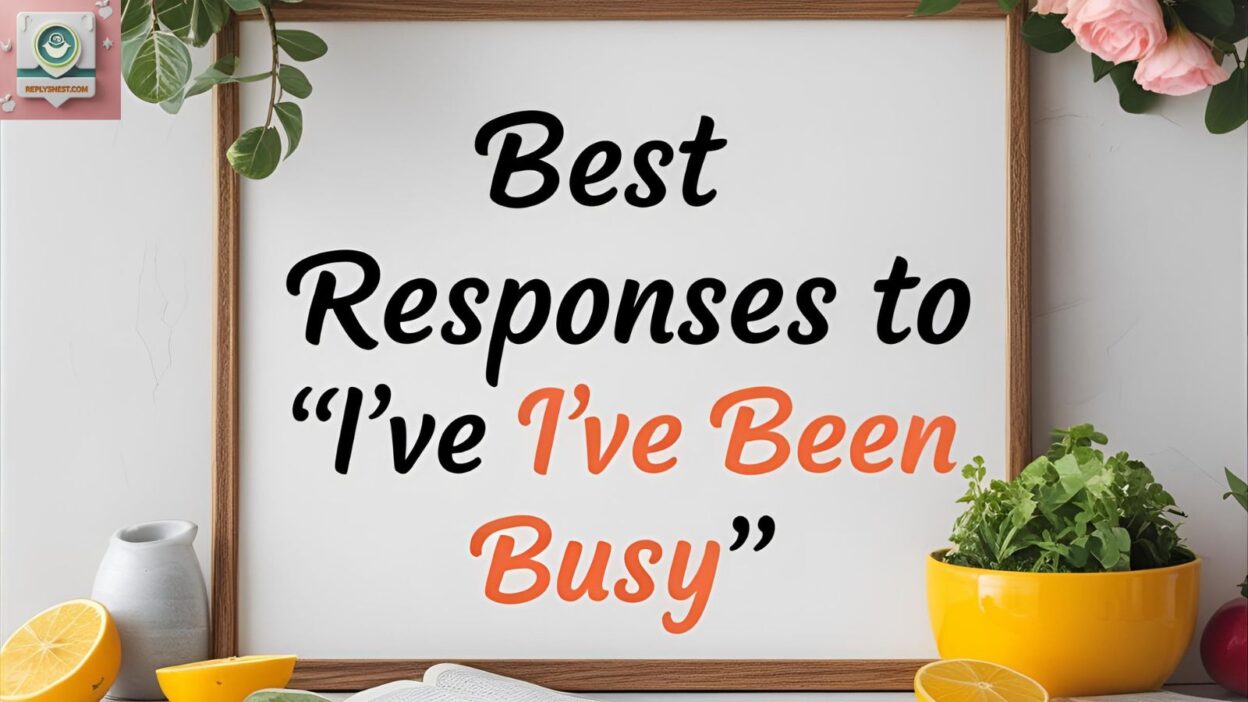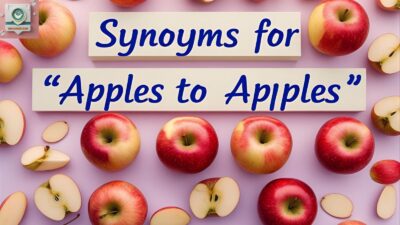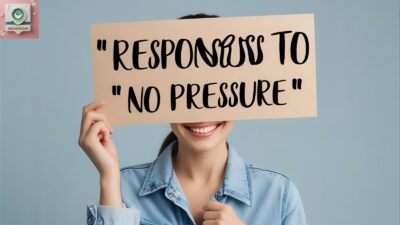When someone says, “I’ve been busy,” they’re often giving you a peek into their mental and emotional bandwidth. Sometimes it’s honest, sometimes it’s an excuse but how you respond can build empathy, connection, or even set boundaries with grace. Whether it’s a friend, a partner, or a co-worker, how you acknowledge their “busy” status says a lot about you, too. Best Responses to “I’ve Been Busy”.
In this article, we’re diving into 30 thoughtful, warm, and emotionally intelligent ways to respond to “I’ve been busy” with a conversational tone and practical examples to help you navigate real conversations.
1. “I totally get that. Life can be overwhelming sometimes.”
We all go through seasons where life feels like too much. This response shows understanding without judgment and leaves the door open for deeper conversation.
- Best Use: When speaking to someone who seems emotionally drained.
- Not to Use: If you’re feeling neglected and want to confront it directly.
- Other Ways to Say: “Yeah, it really does get hectic sometimes.”
- Example: “I totally get that. Life can be overwhelming sometimes—hope you’re taking care of yourself too.”
Read More: Best Responses to “TFTI”
2. “Thanks for getting back to me — I appreciate it.”
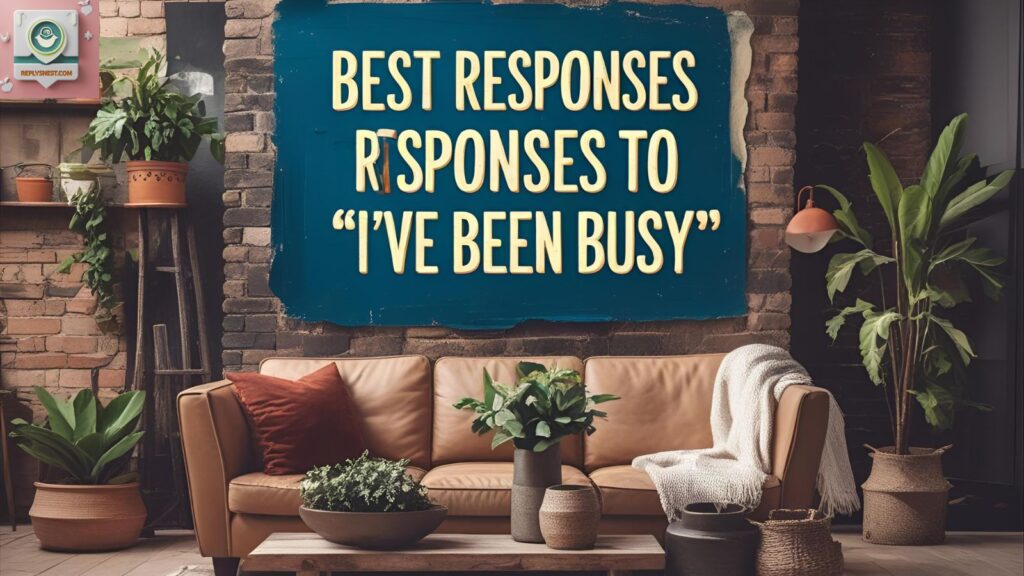
This keeps the tone grateful and patient, which is ideal if you’re rekindling a chat after a long pause.
- Best Use: For professional or casual conversations where you don’t want to come across as pushy.
- Not to Use: If the delay was part of a recurring pattern and you feel taken for granted.
- Other Ways to Say: “Glad to hear from you, thanks for reaching out.”
- Example: “Thanks for getting back to me — I know things can pile up fast.”
3. “No worries at all — I’ve had those weeks too.”
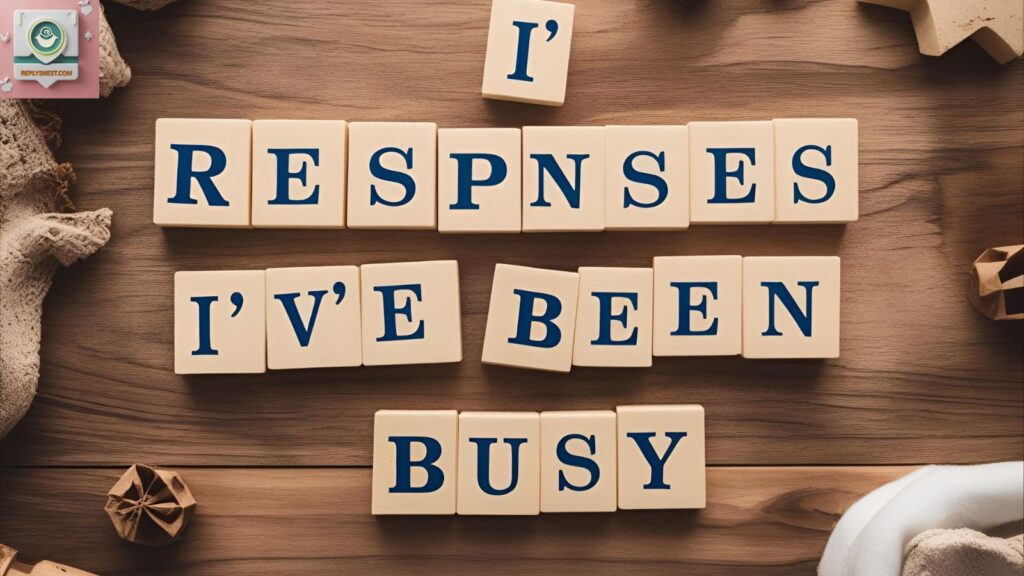
This one makes the other person feel seen and not alone, offering a light sense of camaraderie.
- Best Use: When you’re reconnecting after a short break in communication.
- Not to Use: If you’re feeling hurt or deeply disappointed.
- Other Ways to Say: “I’ve definitely been there too.”
- Example: “No worries at all — I’ve had those weeks too. Hope things are settling down for you.”
4. “You don’t have to explain, I get it.”
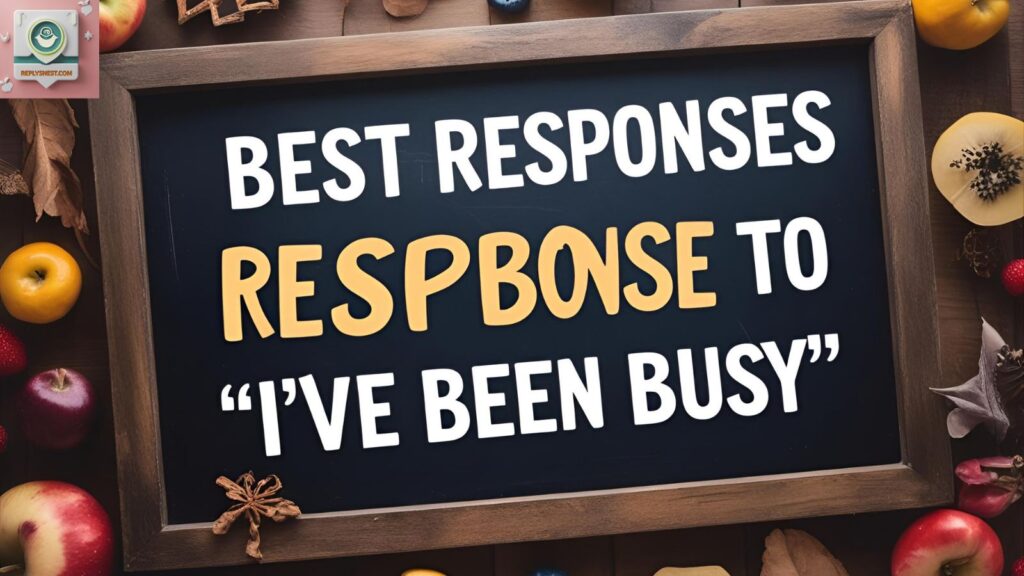
Sometimes people feel guilty about not replying. This removes pressure and guilt, which builds emotional trust.
- Best Use: When someone sounds apologetic.
- Not to Use: If you genuinely feel dismissed or ignored.
- Other Ways to Say: “I understand, really.”
- Example: “You don’t have to explain, I get it. Just glad to hear from you.”
5. “Sounds like you’ve had a full plate — how are you doing now?”
This shifts the focus from justifying the past to how they’re feeling in the present moment, encouraging deeper check-in.
- Best Use: For friends or loved ones who may need a safe space to vent.
- Not to Use: In highly professional settings.
- Other Ways to Say: “How’s everything going for you lately?”
- Example: “Sounds like you’ve had a full plate — how are you doing now?”
6. “It’s okay, I’m still here.”
A warm, emotionally grounded reply that offers reassurance without guilt-tripping.
- Best Use: For close relationships or intimate friendships.
- Not to Use: If the person has ghosted you too many times.
- Other Ways to Say: “I’m here when you’re ready.”
- Example: “It’s okay, I’m still here whenever you’re ready to catch up.”
7. “That makes sense — anything I can do to support you?”
This response is actionable and caring, showing you’re not just waiting but willing to help.
- Best Use: With people you care about and want to help.
- Not to Use: If they’ve been unresponsive repeatedly.
- Other Ways to Say: “Let me know if there’s anything I can do.”
- Example: “That makes sense — anything I can do to support you right now?”
8. “Missed you! Glad you’re okay.”
Sometimes people disappear, and this gives a gentle nudge that you noticed — without drama.
- Best Use: Casual friendships or long-distance connections.
- Not to Use: In formal or work contexts.
- Other Ways to Say: “Happy to hear from you again.”
- Example: “Missed you! Glad you’re okay — hope life’s treating you well.”
9. “Totally understand — just happy to reconnect now.”
Keeps things positive and forward-looking, great for keeping momentum in conversations.
- Best Use: When you’re ready to move forward with the conversation.
- Not to Use: If unresolved emotions are still lingering.
- Other Ways to Say: “Let’s pick up where we left off.”
- Example: “Totally understand — just happy to reconnect now.”
10. “Been there. Hope you’re finding some peace in the chaos.”
This shows empathy while acknowledging how tough life gets.
- Best Use: For friends juggling work, family, or personal struggles.
- Not to Use: With acquaintances or casual contacts.
- Other Ways to Say: “Hope you’re holding up okay.”
- Example: “Been there. Hope you’re finding some peace in the chaos.”
11. “I figured something came up — all good!”
This reflects understanding without judgment, perfect when you don’t want to make things awkward.
- Best Use: With colleagues or people who usually respond quickly.
- Not to Use: If there’s a history of flaky behavior.
- Other Ways to Say: “No biggie, I figured you were busy.”
- Example: “I figured something came up — all good on my end.”
12. “Same here — it’s been one of those months.”
Relating to their situation makes things feel less one-sided and more human.
- Best Use: For mutual check-ins.
- Not to Use: If you’re upset about lack of communication.
- Other Ways to Say: “I’ve been swamped too.”
- Example: “Same here — it’s been one of those months. Let’s catch up when things calm down.”
13. “Hope it was the good kind of busy!”
Lighthearted and slightly humorous — a way to turn the tone playful.
- Best Use: When you want to keep things casual and breezy.
- Not to Use: In emotionally heavy situations.
- Other Ways to Say: “Busy with good stuff, I hope?”
- Example: “Hope it was the good kind of busy — like vacations or new adventures?”
14. “I thought of you the other day!”
This re-establishes warmth and shows they’ve been on your mind, without pressure.
- Best Use: To re-engage gently.
- Not to Use: If you need closure or serious conversation.
- Other Ways to Say: “You popped into my head recently.”
- Example: “I thought of you the other day — something reminded me of our last chat.”
15. “Good to hear from you — what’s been keeping you busy?”
A polite invitation to share more, encouraging a real conversation.
- Best Use: When you’re genuinely interested.
- Not to Use: If you’re feeling emotionally done.
- Other Ways to Say: “What’s been going on lately?”
- Example: “Good to hear from you — what’s been keeping you so busy?”
16. “No pressure to reply fast — just glad we’re in touch.”
This gives space and respects boundaries while expressing connection.
- Best Use: With emotionally sensitive or distant people.
- Not to Use: If you’re in an urgent situation.
- Other Ways to Say: “Take your time.”
- Example: “No pressure to reply fast — just glad we’re in touch again.”
17. “I know how it goes — hope you’re making time for rest too.”
This response blends empathy with encouragement, gently prioritizing wellness.
- Best Use: For friends, family, or burnt-out colleagues.
- Not to Use: When you’re trying to address something unresolved.
- Other Ways to Say: “Don’t forget to breathe.”
- Example: “I know how it goes — hope you’re making time for rest too.”
18. “We all get swamped sometimes. I’m still around.”
Reaffirms your steady presence without blame or pressure.
- Best Use: When you want to reassure someone who’s gone silent.
- Not to Use: In one-sided friendships that feel draining.
- Other Ways to Say: “Still here when you’re ready.”
- Example: “We all get swamped sometimes. Just letting you know I’m still around.”
19. “Let’s make time when things calm down — I’d love that.”
Proactive and positive, this keeps momentum going toward reconnection.
- Best Use: For friends or partners with hectic lives.
- Not to Use: If they keep canceling plans.
- Other Ways to Say: “Would love to catch up soon.”
- Example: “Let’s make time when things calm down — I’d love to reconnect properly.”
20. “You don’t owe me an explanation — I’m just glad we’re talking.”
Letting go of expectations builds emotional maturity and trust.
- Best Use: When someone seems hesitant or guilty.
- Not to Use: If it’s a pattern that needs addressing.
- Other Ways to Say: “I’m just happy we’re chatting now.”
- Example: “You don’t owe me an explanation — I’m just glad we’re talking again.”
21. “Feel free to hit me up when things slow down.”
Shows respect for their current bandwidth, while keeping the connection alive.
- Best Use: For flexible relationships or distant friends.
- Not to Use: If you’re craving immediate answers.
- Other Ways to Say: “Let’s touch base when you have room.”
- Example: “Feel free to hit me up when things slow down on your end.”
22. “Life gets in the way, and that’s okay.”
A simple reminder that being human is allowed.
- Best Use: With people going through transitions or tough times.
- Not to Use: With someone using it as an excuse constantly.
- Other Ways to Say: “That’s just life sometimes.”
- Example: “Life gets in the way, and that’s okay — just glad to hear from you.”
23. “We’ll catch up when the time’s right.”
Calm, trusting, and emotionally intelligent, this avoids pressure.
- Best Use: For mature relationships.
- Not to Use: If the relationship feels imbalanced.
- Other Ways to Say: “I trust the timing.”
- Example: “No worries — we’ll catch up when the time’s right.”
24. “You’ve got this — hope you’re managing okay.”
An encouraging note to show care and support from afar.
- Best Use: For those who are visibly overwhelmed.
- Not to Use: In situations where emotional validation is needed more than motivation.
- Other Ways to Say: “Rooting for you.”
- Example: “You’ve got this — hope you’re managing okay with everything going on.”
25. “Let’s not lose touch — I value our conversations.”
End on a heartfelt note that strengthens emotional connection.
- Best Use: With people you want to keep close, even from a distance.
- Not to Use: If you’re trying to close a chapter.
- Other Ways to Say: “Let’s keep this going.”
- Example: “Let’s not lose touch — I really value our conversations.”
Conclusion: A Little Empathy Goes a Long Way
We all get busy. That’s just part of being human in today’s fast-moving world. But how we respond to someone saying “I’ve been busy” makes all the difference in whether the relationship deepens, stalls, or quietly fades.
As someone who’s juggled multiple roles a full-time career, creative projects, family, and friendships I’ve learned that empathy, not expectation, is what sustains meaningful communication. Use these responses as gentle, emotionally intelligent tools to keep your connections warm, respectful, and real.
When in doubt, lead with kindness over confrontation, and remember: behind “I’ve been busy” is often someone just doing their best.
